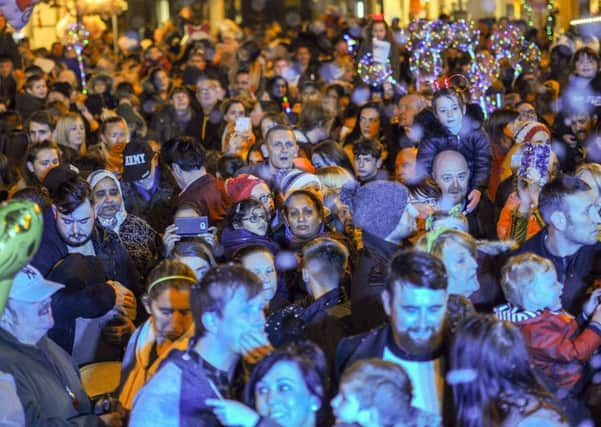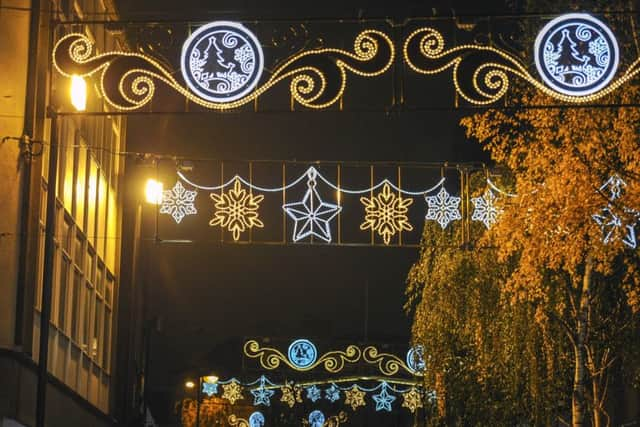Simon Cowling: All are welcome in Wakefield as we share the light of God's love


It was a great all-age community event with excited children and indulgent grandparents particularly evident. As we waited in the Cathedral, I was able to chat to representatives of some of the local businesses who had helped to fund the new Christmas lights. I was struck by their commitment to making our city a place of warmth and welcome for people.
I was also glad to be part of a Wakefield Christmas for the first time since moving here in the autumn as the new Dean of the Cathedral. When the time arrived for the switch to be thrown, I was also glad that it was Wakefield Trinity’s players who led the way to the podium: there was definitely no arguing with them as they cleared a path for us through the crowds!
Advertisement
Hide AdAdvertisement
Hide AdBethlehem was an equally crowded place 2,000 years ago, though not quite so welcoming as Wakefield for a heavily pregnant young woman called Mary and her anxious husband, Joseph.


They had no equivalent of helpful rugby players to clear a path for them through the streets.
Mary and Joseph had walked south for nearly a hundred miles from Nazareth, where they lived, because the Roman emperor had ordered a giant census. That was before the days of filling in forms online. Everyone in the Roman Empire had to go to their ancestral home to register their name so it was scarcely surprising that all available accommodation in Bethlehem, where Joseph’s family had originally come from, was fully booked. There was no room at any of Bethlehem’s inns for Mary and Joseph, so they had to make do with a stable. And when Mary gave birth she had no other option but to use the animals’ feeding trough – the manger – for the baby’s crib.
Over the next few days, thousands of people will come to the glorious surroundings of Wakefield Cathedral to hear once again this great story of a child’s birth. Candles and beautiful music will add to the atmosphere.
Advertisement
Hide AdAdvertisement
Hide AdEveryone of all faiths and no faith will be equally welcome to what I like to think of as the people’s cathedral.
But it is important to remember that the Christmas story is not just a single moment in time which we recreate in Advent calendars, Christmas cards and crib scenes. The Christmas story is actually just the first chapter of a much longer story, the story of God’s love for the whole world. This story began 2,000 years ago with a dangerous birth in dirty surroundings in a small Middle Eastern town, but it continues today because the child who was born in Bethlehem, Jesus, grew up and changed the lives of a small group of followers, his disciples.
They realised that Jesus was God’s son, the very embodiment of God’s love, and they took up Jesus’s challenge to share the good news of God’s love with everyone.
Jesus and his disciples started a wonderful chain reaction which enables billions of Christians worldwide to tell of God’s love today in all sorts of places throughout the world, especially to those who are poor, disabled or imprisoned and who are so often forgotten – as they were in Jesus’s time.
Advertisement
Hide AdAdvertisement
Hide AdWe’re living through uncertain times in the UK at the moment. The consequences of the vote to leave the European Union have been challenging for the whole nation. People who were born abroad but who have lived here for decades are feeling vulnerable; people who voted to leave the EU are continuing to feel ignored when they hear about the possibility of another referendum; everyone is uncomfortably aware of an increasingly unpleasant side to our political debate.
But the good news of God’s love that we’ll be celebrating this Christmas allows us to glimpse another way – a way that shows us how to set aside our divisions for the sake of the common good.
A few weeks ago, we gave thanks for the truce that ended the carnage of the First World War. Four years earlier, on the first Christmas Eve on the Western Front, German soldiers had placed lit Christmas trees along the parapets of their dugouts.
This prompted a similar response from the British army. One rifleman wrote: “Fighting ceased (and) the two lines looked like an illuminated fete…. we had all the candles and lights we could muster stuck on our bayonets above the parapet.” Fighting stopped for 24 hours.
Advertisement
Hide AdAdvertisement
Hide AdImagine how differently things might have turned out if those lights had remained on the parapets a little longer, lighting a path towards peace like the light of God’s love which came to earth in Bethlehem. May that love bless you this Christmas.
Simon Cowling is the Dean of Wakefield.